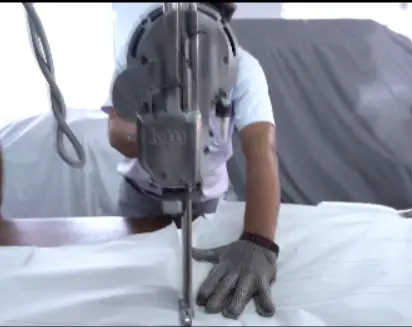
How Proper Layering Can Deliver 100% Shape, Quality & On-Time Shipments
Introduction
In high-volume apparel manufacturing, cutting accuracy is the cornerstone of fit, quality, and delivery reliability. A single misaligned panel can cascade into seam mismatches, rework, and late shipments, jeopardizing both your brand reputation and your bottom line. In this article, you’ll learn:
- The root cause of cutting errors
- A proven, three-step process to eliminate them
- How to implement these best practices in your next production run
Plus, don’t miss my 100-second video demo showing exactly how to put these steps into action:
▶️ Watch on YouTube Shorts
1. The Cutting Accuracy Challenge
1.1 Fabric Layer Shifting
When cutting multiple layers of fabric at once, tension or uneven spreading leads to layer drift. This drift creates panels that are slightly off-shape—a tiny error multiplied across hundreds or thousands of pieces.
1.2 Impact on Production
- Misaligned Seams: Stitching errors that compromise aesthetics and durability
- Fit Variations: Garments that fail to meet size-spec tolerances
- Increased Rejections: More time & cost spent on quality checks and rework
- Delayed Shipments: Bottlenecks in sewing, finishing, and packing
2. Three-Step Solution for 100% Accuracy
Step 1: Rest Fabric 12–48 Hours
Why it works: After unrolling, fabrics experience residual tension and mechanical stress. Allowing them to relax overnight (or longer) reduces shrinkage and warp before cutting.
- Action: Unroll fabric rolls and let them settle in your cutting room for at least 12 hours.
- Benefit: Consistent layer thickness and predictable behavior under the blade.
Step 2: Sharp Blades & Tension-Free Layering
Why it works: Dull blades tug on fibers. Tension in layered spreads pulls layers apart. Together, they cause jagged cuts and drift.
- Action:
- Replace blades daily (or after 8–10 hours of cutting).
- Use clamps or weights—never stretch—when spreading layers.
- Benefit: Clean, precise cuts that match your markers exactly.
Step 3: Accurate Markers & Skilled Operators
Why it works: Even with perfect fabric prep, poor marker placement or inexperienced cutters introduce human error.
- Action:
- Use digitally generated markers with minimal wastage.
- Train operators on template alignment and scanning tools for real-time feedback.
- Benefit: First-time-right panels, reduced quality checks, and faster downstream operations.
3. Embedding the Video Demonstration
4. Real-World Benefits
| Benefit | Impact |
|---|---|
| 100% Panel Shape Accuracy | Eliminate rework & reduce material waste |
| Seam Alignment Consistency | Enhance garment durability & customer satisfaction |
| Streamlined Production Flow | Shorten lead times & secure on-time shipments |
| Lower Quality-Check Overheads | Reallocate resources to innovation & growth |
5. Call to Action
Ready to elevate your apparel production? Whether you’re a brand, buyer, or sourcing manager, these best practices will pay dividends from your very next order.
📩 Connect with me for tailored sourcing and manufacturing solutions from Bangladesh:
- Email: antor@antor.xyz
- Visit: antor.xyz
🔗 Share this article with your network to help other professionals unlock precision and performance in garment manufacturing!






